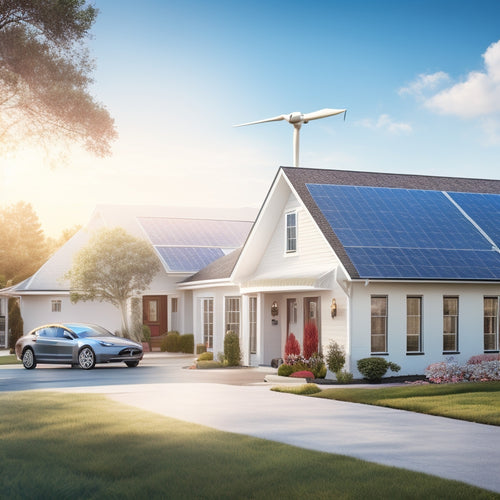
10 Solar Panel Financing Options for Homeowners
Share
You have several solar panel financing options available to help you go green and reduce your energy bills. You can explore government incentives like California State Rebate Programs and the Federal Solar Investment Tax Credit. Loan options include home equity loans, Property Assessed Clean Energy, and solar loans from manufacturer partners. Alternatively, you can consider solar panel leasing, Power Purchase Agreements, community solar programs, and crowdfunding for solar installations. There are many ways to make solar energy affordable, and understanding each option can help you make an informed decision about your renewable energy investment. Your path to solar energy starts here.
Key Takeaways
• Homeowners can explore state rebate programs like California's CSI Thermal Program and federal incentives like the Solar Investment Tax Credit.
• Financing options include home equity loans, solar loans, and leasing options with competitive rates and flexible terms.
• Alternative financing models like Power Purchase Agreements and Community Solar Programs offer fixed monthly rates and shared benefits.
• Crowdfunding platforms and manufacturer partners provide additional financing opportunities with attractive terms and rebates.
• Homeowners should consider factors like predictable monthly payments, maintenance services, and potential tax deductions when choosing a financing option.
California State Rebate Programs
California offers several state rebate programs that provide financial incentives to homeowners who install solar panels, including the California Solar Initiative (CSI) Thermal Program and the Self-Generation Incentive Program (SGIP).
You, as a homeowner, can take advantage of these incentives to reduce the upfront cost of going solar. The CSI Thermal Program, for instance, provides rebates of up to $1,500 for solar water heating systems. Meanwhile, the SGIP offers incentives for residential and commercial customers who install energy storage systems, including solar-powered batteries.
These California incentives are made possible by state legislations that support the adoption of renewable energy. You can think of them as a pat on the back from the California government for doing your part in reducing the state's carbon footprint.
Federal Solar Investment Tax Credit
As a homeowner, you're eligible to claim a substantial portion of your solar panel installation costs as a credit on your federal taxes through the Federal Solar Investment Tax Credit (ITC), which provides a dollar-for-dollar reduction of up to 26% of your total expenditure.
This is a substantial perk, as it can greatly offset the upfront cost of going solar. The ITC is a valuable tax benefit that can help you recoup some of the costs associated with installing solar panels. By claiming the ITC, you can reduce your tax liability, freeing up more funds for other important investment strategies.
For instance, you could use the savings to invest in energy-efficient upgrades or other home improvements. With the ITC, you can enjoy the benefits of solar energy while also maximizing your tax benefits.
Home Equity Loans for Solar
You can tap into your home's equity to fund your solar panel installation with a home equity loan, which offers a low-interest, tax-deductible financing option. This type of loan allows you to borrow against the value of your home, using the equity you've built up over time. The Loan Benefits of a home equity loan include a fixed interest rate and potential tax deductions on the interest paid. Plus, the loan proceeds can be used to cover the upfront cost of solar panels, making it a viable option for homeowners.
When considering a home equity loan, it's essential to understand your Equity Values. The amount you can borrow depends on the current market value of your home, minus any outstanding mortgage balances. With a home equity loan, you can tap into this value to fund your solar panel installation. Keep in mind that you'll need to have sufficient equity in your home to qualify, and you'll need to make regular loan payments to avoid putting your home at risk.
Property Assessed Clean Energy
As you consider financing options for your solar panel installation, you may want to explore Property Assessed Clean Energy (PACE) programs. Through PACE, you can fund your project by borrowing money that's repaid through an annual assessment on your property tax bill.
In the following sections, we'll outline how PACE works, the types of projects that are eligible, and the repayment terms you can expect.
How It Works
Through a Property Assessed Clean Energy (PACE) program, your local government partners with private investors to provide financing for solar panels, allowing homeowners like you to repay the loan via an annual assessment on their property tax bill. This innovative financing model enables you to invest in solar energy without upfront costs, making it more accessible and affordable.
Here's how it works:
| Step | Description |
|---|---|
| 1. Application | You apply for PACE financing through an approved provider. |
| 2. Approval | Your application is reviewed, and you're approved for financing. |
| 3. Installation | A certified installer installs your solar panel system. |
| 4. Repayment | You repay the loan through an annual assessment on your property tax bill. |
With PACE financing, you can focus on reaping the benefits of solar energy, including increased energy efficiency and reduced carbon emissions. Plus, you'll be contributing to a more sustainable future through solar education and energy-efficient practices. By leveraging PACE financing, you can go solar without breaking the bank!
Eligible Projects
PACE programs can finance a wide range of energy-efficient improvements, including solar panels, energy-efficient windows, and insulation, allowing homeowners to upgrade their properties with environmentally friendly features. You can think of it as a one-stop-shop for all your energy-efficient needs.
As a homeowner, you're probably curious about what else is eligible for financing. Well, you'll be happy to know that PACE programs also cover energy-efficient upgrades like doors, roofing, and even energy storage systems. If you're looking to reduce your carbon footprint, you can also finance energy-efficient appliances, HVAC systems, and even electric vehicle charging stations. The list goes on!
The beauty of PACE programs lies in their flexibility. You can bundle multiple projects together, maximizing your energy efficiency and renewable incentives. By doing so, you'll not only reduce your energy consumption but also increase your property value. It's a win-win situation!
Repayment Terms
You'll repay your PACE financing through an annual assessment on your property tax bill, with repayment terms typically ranging from 5 to 25 years. This allows you to budget your expenses and plan for the future.
Here's a breakdown of what you can expect:
| Repayment Term | Monthly Payments | Interest Rates |
|---|---|---|
| 5 years | $200-$300 | 6.5%-7.5% |
| 10 years | $100-$200 | 7.0%-8.0% |
| 15 years | $70-$150 | 7.5%-8.5% |
| 20 years | $50-$120 | 8.0%-9.0% |
| 25 years | $40-$100 | 8.5%-9.5% |
Keep in mind that these are general estimates and your actual repayment terms may vary. Be sure to review your financing agreement carefully and ask questions if you're unsure about any aspect of the repayment process. Remember, PACE financing is a long-term commitment, so it's essential to choose a repayment term that works for you.
Solar Loans From Manufacturer Partners
Many solar manufacturers, including industry giants like SunPower and Tesla, offer financing options directly to homeowners, allowing them to purchase their solar panels with reduced upfront costs. This approach can be a game-changer, especially for those who want to switch to renewable energy but are hesitant due to the high initial investment. By partnering with manufacturers, you can benefit from their financing options, which often come with attractive terms and incentives.
Here are some benefits you can expect from solar loans from manufacturer partners:
-
Competitive Interest Rates: Manufacturers often offer lower interest rates compared to traditional banks, making it more affordable to go solar.
-
Manufacturer Incentives: You may be eligible for rebates, discounts, or other perks when you finance through a manufacturer partner.
-
Streamlined Process: Manufacturers often have a more streamlined process, making it easier to get approved and get your solar panels installed.
- Partner Benefits: You may gain access to exclusive benefits, such as priority customer support or extended warranties, when you finance through a manufacturer partner.
Financing Through Local Banks
When exploring financing options for your solar panel system, you might want to explore approaching local banks that offer specialized loan programs for renewable energy projects. These banks often provide competitive interest rates and flexible repayment terms, making it easier for you to go solar.
Bank Loan Options
Through partnerships with local banks, homeowners can access financing options that enable them to purchase solar panels while spreading the cost over several years. This allows you to start reaping the benefits of solar energy without breaking the bank.
When exploring bank loan options, you'll come across two primary types: secured and unsecured financing.
Here are some key advantages to take into account:
-
Flexibility: Bank loans often offer flexible repayment terms, allowing you to choose a payment schedule that suits your budget.
-
Competitive rates: Local banks may offer competitive interest rates compared to other financing options.
-
Tax benefits: You may be eligible for tax deductions on the interest paid on your loan.
- No prepayment penalties: Many bank loans don't come with prepayment penalties, giving you the freedom to pay off your loan early if you choose to.
Local Incentives Offered
Local banks may offer additional incentives, such as rebates or low-interest loans, that can greatly reduce the upfront cost of solar panel installation, making it more affordable for you to go solar. These local incentives can be a game-changer in getting you started on your solar journey.
| Incentive Type | Description |
| Utility Discounts | Discounts on your utility bills for going solar |
| Municipal Grants | Grants from local governments to support renewable energy |
| Low-Interest Loans | Loans with lower interest rates for solar panel installation |
| Rebates | Cashback rewards for installing solar panels |
Solar Panel Leasing Options
You can opt for a solar panel leasing agreement, which allows you to rent a system from a provider, typically for a fixed monthly fee, without the upfront cost of purchasing the equipment. This option is perfect for homeowners who want to switch to solar energy without breaking the bank. With a leasing agreement, you'll typically sign a contract for a set period, usually 10 to 20 years, and make monthly payments to use the system.
Here are some key benefits to take into account:
-
Predictable monthly payments: You'll know exactly how much you'll pay each month, making it easier to budget.
-
No upfront costs: You won't have to shell out thousands of dollars to install the system.
-
Lease duration flexibility: You can choose a lease duration that fits your needs, from 10 to 20 years.
- Maintenance and repair are handled by the provider: You won't have to worry about fixing or replacing the system if something goes wrong.
With a solar panel leasing agreement, you can enjoy the benefits of solar energy without the hefty upfront cost. Just remember to carefully review the terms and conditions of your lease to make sure it's the right fit for you.
Power Purchase Agreements
As you explore power purchase agreements (PPAs), you'll find that they offer a unique financing solution for homeowners.
With a PPA, you'll enter into a long-term contract with a solar panel provider, who'll install and maintain the system on your property in exchange for a fixed rate per kilowatt-hour of generated electricity.
How It Works
Under a Power Purchase Agreement (PPA), a third-party provider installs, maintains, and owns the solar panel system on your property. You, as the homeowner, get to enjoy the benefits of solar energy without having to pay upfront costs. Here's how it works:
-
Zero Upfront Costs: You don't pay a dime for the installation, maintenance, or repairs of the solar panel system.
-
Fixed Monthly Rate: You pay a fixed monthly rate for the electricity generated by the solar panels, which is often lower than your current utility bill.
-
Solar Savings: You enjoy the benefits of solar energy, including reduced energy bills and a smaller carbon footprint.
- Energy Efficiency Guaranteed: The provider makes sure the system operates at peak levels, so you can relax knowing you're getting the most out of your solar panels.
With a PPA, you're essentially purchasing the electricity generated by the solar panels at a fixed rate, rather than buying the system itself. This financing option is perfect for homeowners who want to switch to solar energy without breaking the bank.
Benefits Explained
What makes Power Purchase Agreements particularly appealing is that they provide homeowners with a unique set of benefits, including predictable energy costs, reduced carbon emissions, and increased property value. With a PPA, you'll enjoy fixed energy rates, shielding you from rising utility bills. Plus, you'll be contributing to a cleaner environment, reducing your carbon footprint and gaining some serious environmental savings.
Here's a breakdown of the benefits in a nutshell:
| Benefit | Description | Your Gain |
|---|---|---|
| Predictable Energy Costs | Fixed energy rates for a set period | Financial freedom from rising utility bills |
| Reduced Carbon Emissions | Contribute to a cleaner environment | Environmental savings and a clear conscience |
| Increased Property Value | Boost your property's value with solar panels | Increased resale value and appeal |
Community Solar Programs
You can participate in community solar programs, which allow multiple individuals or organizations to share the benefits of a single solar array, often located off-site. This innovative approach makes solar energy more accessible, especially for those who can't install panels on their own property. Community solar programs are ideal for renters, those with shaded roofs, or those who can't afford a full system.
Here are some benefits of community solar programs:
-
Shared Renewable Energy: Multiple subscribers share the energy generated by a single solar array, reducing the cost and environmental impact.
-
Rural Development: Community solar programs can bring clean energy to rural areas, promoting rural development and energy independence.
-
Flexible Subscription Options: You can choose a subscription plan that suits your energy needs and budget, with options for fixed or variable pricing.
- Low Upfront Costs: Community solar programs often require minimal or no upfront costs, making solar energy more affordable for homeowners.
Crowdfunding for Solar Installations
Through crowdfunding platforms, individuals can raise funds for solar installations by pooling small contributions from a large number of people. This approach makes solar energy more accessible to those who may not have had the means to invest in it otherwise. You can think of it as a digital bake sale, but instead of buying cookies, people are investing in a cleaner, greener future.
As you explore crowdfunding options, you'll find platforms that cater specifically to solar installations, offering a range of benefits, from social impact to community engagement. By supporting a crowdfunded solar project, you're not only helping someone go green but also fostering community engagement and promoting a cleaner environment. It's a win-win!
You'll be contributing to a social impact that resonates beyond the individual installation, inspiring others to follow suit. So, if you're looking for a financing option that's as innovative as it's effective, crowdfunding might be the way to go. It's time to harness the power of the crowd to power your home with solar energy!
Frequently Asked Questions
Can I Finance Solar Panels if I Rent My Home?
"Sorry to burst your solar bubble, but as a renter, you'll need to get your landlord's approval and check if your rent restrictions allow for solar installations - it's not a DIY project, sadly!"
Do Solar Financing Options Affect My Credit Score?
"When you apply for solar financing, you'll likely see a soft credit inquiry, temporarily dipping your credit score. However, making loan payments on time can positively impact your credit score, and some loan options won't affect it at all, so breathe easy!"
Are There Financing Options for Low-Income Households?
You'll be happy to know that, yes, there are financing options for low-income households! Government incentives and energy equity initiatives can help make solar energy more accessible, even on a tight budget.
Can I Cancel My Solar Financing Contract?
You're wondering if you can cancel your solar financing contract? Check the fine print for early termination clauses, as you may face penalties or fees. Contract disputes can arise, so review carefully to avoid any sticky situations!
Are There Solar Financing Options for Non-Profit Organizations?
You're wondering if non-profits can score solar financing options? Yes, they can! You can explore grant funding, corporate sponsorships, and even crowdfunding to power up your social mission with clean energy.
Related Posts
-

Why You Need a Phone Mount for Navigation
When you're on the road, a reliable phone mount is not just a convenience, it's a safety necessity that helps you mai...
-

Solar Panel System Certification Costs: A 10-Point Breakdown
You're looking to understand the costs associated with solar panel system certification. Your total certification cos...
-

Why Homeowners Are Embracing DIY Energy Independence
By taking control of your energy needs, you're breaking free from the uncertainty of utility bills and embracing a se...


